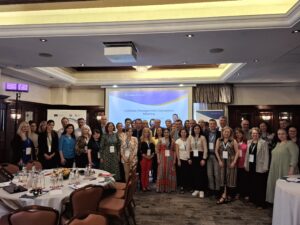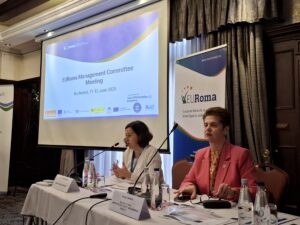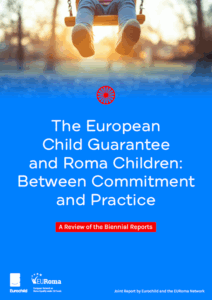 European Commission Executive Vice-President Roxana Mînzatu, together with representatives of the Romanian authorities and the Technical Secretariat of the Network (Fundación Secretariado Gitano), opened the meeting and welcomed the participants. Ms. Mînzatu emphasised the importance of EU financial instruments to contribute to the efforts being made in the EU to achieve real changes in the situation of Roma people, following the EU Framework for National Roma Integration Strategies.
European Commission Executive Vice-President Roxana Mînzatu, together with representatives of the Romanian authorities and the Technical Secretariat of the Network (Fundación Secretariado Gitano), opened the meeting and welcomed the participants. Ms. Mînzatu emphasised the importance of EU financial instruments to contribute to the efforts being made in the EU to achieve real changes in the situation of Roma people, following the EU Framework for National Roma Integration Strategies.
The EURoma Network (European Network for Roma Equality through European Funds) held its last meeting on June 11-12 in Bucharest. The meeting was attended by partner authorities of the Network (in particular, National Contact Points and public authorities in charge of ESF+ and ERDF) from 12 EU Member States, as well as representatives of the European Commission and the European Union Agency for Fundamental Rights (FRA). As usual, representatives of the Romanian authorities and organisations, as host country, also participated in the meeting, especially on the second day, which focused on the situation in the country.
The Executive Vice-President of the European Commission for Social Rights and Skills, Quality Employment and Skills, Roxana Mînzatu (through video message), together with representatives of the Romanian authorities and the Technical Secretariat of the Network (Fundación Secretariado Gitano), opened the meeting and welcomed the participants. Ms. Mînzatu emphasised the importance of EU financial instruments to contribute to the efforts being made in the EU to achieve real changes in the situation of Roma people, following the EU Framework for National Roma Integration Strategies.
Participants had the opportunity to discuss different policy and legislative developments relevant to the Roma population, such as the review of the implementation of the National Roma Inclusion Strategies, the Child Guarantee, as well as the strategies being prepared in the fight against racism, poverty and housing.
They also discussed the use of ESF+ and ERDF for Roma equality and inclusion in the current programming period as well as how to ensure that European funds continue to play the role they have now for vulnerable groups such as the Roma population in the next programming period.
Finally, they could learn more about the context of Romania, the host country, including the policy framework related to Roma euqality and inclusion and the financial instruments available, namely ESF+ and ERDF (used both at national and regional level), as well as other funds such as the Norwegian Funds-EEA Grants. Specific initiatives financed by ESF+ or ERDF and other funds were then presented.
Welcome and opening remarks
 Roxana Mînzatu, Executive Vice-President of the European Commission for Social Rights and Skills, Quality Employment and Skills (through video message), Carmen Moraru, State Secretary of Romanian Ministry of Investments and European Projects, and EURoma Technical Secretariat were in charge of opening the meeting and welcoming participants. Ms. Mînzatu emphasised the importance of EU financial instruments to contribute to the efforts being made in the EU to achieve real changes in the situation of Roma people, following the EU Framework for National Roma Integration Strategies.
Roxana Mînzatu, Executive Vice-President of the European Commission for Social Rights and Skills, Quality Employment and Skills (through video message), Carmen Moraru, State Secretary of Romanian Ministry of Investments and European Projects, and EURoma Technical Secretariat were in charge of opening the meeting and welcoming participants. Ms. Mînzatu emphasised the importance of EU financial instruments to contribute to the efforts being made in the EU to achieve real changes in the situation of Roma people, following the EU Framework for National Roma Integration Strategies.
Relevant EU poliy and legal developments for Roma equality and inclusion
Participants had the opportunity to discuss relevant EU developments at policy and legislative level of relevance of to achieve Roma equality and inclusion. They included the reporting process that the European Commission is carrying out on the implementation of the National Roma Strategic Frameworks as well as the sectoral policy instruments that are currently being elaborated as regards Anti-Racism, Anti-Poverty and Affordable Housing. 
Particular attention was also paid to the consideration of Roma children in the Child Guarantee. The outcomes of the report carried out by Euroma Network together with Eurochild on how Roma children are addressed in the biennial implementation reports of the Child Guarantee were shared with participants in order to review how to address the different outcomes and recommendations arising from the report. The presentation made by Jaroslav Kling on the situation of Roma children fully justifies the need to ensure that the Child Guarantee meets its goal to reach Roma children and ensure that they contribute to effectively addressing the poverty and inequality gap currently faced by Roma children..
European Cohesion Policy Funds
Partners looked at the use of ESF+ and ERDF to promote Roma equality and inclusion. Firstly, aspects related to the implementation of the current programming period were reviewed. Secondly, they looked at the post-2025 Multiannual Financial Framework and how to ensure that it fully takes into account the situation of vulnerable groups such as Roma and social aspects in general. There was a general consensus on the importance of ensuring that the next programming period acknowledges and pursues the key role that European Funds (notably ESF+ and ERDF) have played to reduce disparities and inequalities for the groups/people in situations of greater exclusion and vulnerability such as Roma.
EURoma work plan and next activities
Partners also had the opportunity to review the upcoming activities of the EURoma Network.
Romanian context as regards Roma equality and inclusion
Representatives from Romanian EURoma partner authorities as well as from other relevant actors shared with participants information on the situation of Roma in the country and on how Roma equality and inclusion are considered, both within the policy framework and as regards the use of ESF+ and ERDF.


